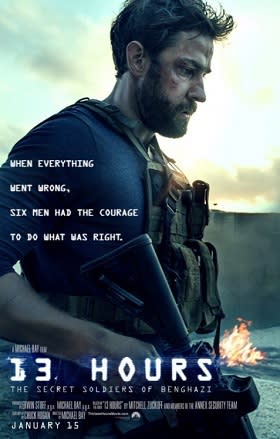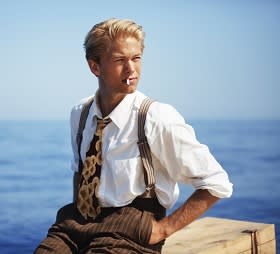Malta builds its international filming appeal
From Steven Spielberg, Ridley Scott and Angelina Jolie to National Geographic documentaries and big name commercials, Malta has become a favourite location for the international film industry.
By Hannah Gal 24 Oct 2016

From Steven Spielberg, Ridley Scott and Angelina Jolie to National Geographic documentaries and big name commercials, Malta has become a favourite location for the international film industry.
Utilising robust and ongoing government backing, the Malta Film Commission has created a memorable filming experience with strong hospitality, local crews trained to Hollywood production standards, uncompromising support for visiting productions and reduced bureaucracy.
Christian McWilliams is an experienced location manager who most recently doubled Malta for Libya in Michael Bay’s gritty war drama 13 Hours: The Secret Soldiers of Benghazi.
“We blew up buildings, flew helicopters low, closed an international airport runway and caused the kind of chaos you would never get away with anywhere else,” McWilliams tells KFTV.
“For the first time ever - for any country I've been to - we were welcomed into Malta by the prime minister’s office. They were interested in the film, cast and the problems that needed solving for road closures and explosions – the door was always open and the political wheels of the government were at the filmmakers’ disposal.”
Ravi Dube worked in Malta on Paul Greengrass’ true-life piracy drama Captain Phillips and the more recent biblical drama Risen, and agrees with McWilliams’ sentiment, recalling swift responses to late-night phone calls he has made to the film commission.
Malta’s long sunny days and geographic proximity to mainland Europe give it a distinct advantage over the competition.
“It has a richer history than most other countries with a depth and range of experiences that rival it to any other place,” says McWilliams. “Morocco competes very well but Malta’s Valetta streets, forts and Mediterranean Sea give it an edge that is unrivalled.”
Dube has filmed in South Africa, New Zealand, Morocco, Namibia, Cambodia, Malaysia and Hungary among other locations, but describes Malta as a warm-hearted place that offers an easy work environment for international producers.

“Malta does not have the landscape of Morocco or Namibia but if your locations will fit, you can have a very easy controlled production with easy-to-deal-with police and government departments, no security problems or thefts, good range of facility vehicles and trucks with experienced drivers and great savings to be made on transport due to Malta’s size.”
Dominic Fumusa was an actor in 13 Hours and considers Malta’s strength to be its “mix of Middle Eastern, North African and Arab cultures”, which makes it an “invaluable” location.
“If you want to substitute for any Arab place in the world but wish to film in a western culture that feels familiar to a western crew and cast, than Malta is the place.”
Malta’s Mediterranean Film Studios (MFS) offer water tank facilities that are amongst the largest in the world. They include a Surface Marine Tank and a Deep Water Marine Tank, which offers a depth of 11 metres. Both offer a natural sea horizon as a backdrop and have hosted productions including Captain Phillips and the 2012 feature Kon-Tiki (pictured above), the true story of explorer Thor Heyerdal’s 1947 effort to sail a balsawood raft across the Pacific as part of an anthropological experiment.
“Several productions filming in Malta also shot elsewhere,” says Jean Pierre Borg of the Malta Film Commission. “Gladiator for instance also shot in Morocco, Assassin’s Creed and Risen also shot in Spain, while Troy also shot in Mexico, which goes to show that while there might be some competition, Malta still possesses unique advantages which still attract productions to our shores.
“We do however lack deserts and mountains, but have successfully serviced these when needed.”
Jakob Ballinger worked in Malta as a gaffer on Angelina Jolie’s relationship drama By the Sea (pictured below) and says that the country needs more rental outlets that can cater more effectively for larger, big-budget productions.
He praises the friendliness of the local crews and highlights their overwhelming “willingness to learn and adapt to international working conditions”, a quality that proved crucial for By The Sea’s cinematographer Christian Berger.
While McWilliams’ expresses a wish for “more roads and more space”, Dube believes “together with the existing tanks at MFS, sound stages would give Malta the winning hand it deserves.”
Sound stages are “already in the making” says Borg, “with five bids, including one from Pinewood Studios currently under consideration by the MFC, and sound stages expected to be added to the present studio complex by end of 2017.”

The Malta Film Commission is careful not to create an impression of a location exclusive to high-end, big-budget productions.
“We welcome all productions,” says Borg. “Although there are no specific incentives as such for independents, our rebate conditions allow for support to productions spending as little as €200,000. This ensures that the incentive is very accessible to even local and international low budget productions.
“All productions, regardless of size, get support on all aspects of the shoot, from securing locations to obtaining location permits. Our incentives apply to all size productions, providing there is a €100,000 minimum spend and providing that the nature of the production is eligible.
“Over the past few years we have serviced both high-profile, big-budget blockbusters, smaller independent productions as well as European productions. Just last year we had the British production The Mercy, The EuropaCorp production The Lake, Belgian production Rox vs Mega Mindy, the French production Immediate Boarding and the independent film The Promise, while in the same year, we had major Hollywood productions 13 Hours and Assassin’s Creed.”
13 Hours image: Paramount Pictures. Kon-Tiki image: Carl Christian Raabe/Nordisk Film. By the Sea image: Universal Pictures
Christian McWilliams is an experienced location manager who most recently doubled Malta for Libya in Michael Bay’s gritty war drama 13 Hours: The Secret Soldiers of Benghazi.
“We blew up buildings, flew helicopters low, closed an international airport runway and caused the kind of chaos you would never get away with anywhere else,” McWilliams tells KFTV.
“For the first time ever - for any country I've been to - we were welcomed into Malta by the prime minister’s office. They were interested in the film, cast and the problems that needed solving for road closures and explosions – the door was always open and the political wheels of the government were at the filmmakers’ disposal.”
Ravi Dube worked in Malta on Paul Greengrass’ true-life piracy drama Captain Phillips and the more recent biblical drama Risen, and agrees with McWilliams’ sentiment, recalling swift responses to late-night phone calls he has made to the film commission.
Malta’s long sunny days and geographic proximity to mainland Europe give it a distinct advantage over the competition.
“It has a richer history than most other countries with a depth and range of experiences that rival it to any other place,” says McWilliams. “Morocco competes very well but Malta’s Valetta streets, forts and Mediterranean Sea give it an edge that is unrivalled.”
Dube has filmed in South Africa, New Zealand, Morocco, Namibia, Cambodia, Malaysia and Hungary among other locations, but describes Malta as a warm-hearted place that offers an easy work environment for international producers.

“Malta does not have the landscape of Morocco or Namibia but if your locations will fit, you can have a very easy controlled production with easy-to-deal-with police and government departments, no security problems or thefts, good range of facility vehicles and trucks with experienced drivers and great savings to be made on transport due to Malta’s size.”
Dominic Fumusa was an actor in 13 Hours and considers Malta’s strength to be its “mix of Middle Eastern, North African and Arab cultures”, which makes it an “invaluable” location.
“If you want to substitute for any Arab place in the world but wish to film in a western culture that feels familiar to a western crew and cast, than Malta is the place.”
Malta’s Mediterranean Film Studios (MFS) offer water tank facilities that are amongst the largest in the world. They include a Surface Marine Tank and a Deep Water Marine Tank, which offers a depth of 11 metres. Both offer a natural sea horizon as a backdrop and have hosted productions including Captain Phillips and the 2012 feature Kon-Tiki (pictured above), the true story of explorer Thor Heyerdal’s 1947 effort to sail a balsawood raft across the Pacific as part of an anthropological experiment.
“Several productions filming in Malta also shot elsewhere,” says Jean Pierre Borg of the Malta Film Commission. “Gladiator for instance also shot in Morocco, Assassin’s Creed and Risen also shot in Spain, while Troy also shot in Mexico, which goes to show that while there might be some competition, Malta still possesses unique advantages which still attract productions to our shores.
“We do however lack deserts and mountains, but have successfully serviced these when needed.”
Jakob Ballinger worked in Malta as a gaffer on Angelina Jolie’s relationship drama By the Sea (pictured below) and says that the country needs more rental outlets that can cater more effectively for larger, big-budget productions.
He praises the friendliness of the local crews and highlights their overwhelming “willingness to learn and adapt to international working conditions”, a quality that proved crucial for By The Sea’s cinematographer Christian Berger.
While McWilliams’ expresses a wish for “more roads and more space”, Dube believes “together with the existing tanks at MFS, sound stages would give Malta the winning hand it deserves.”
Sound stages are “already in the making” says Borg, “with five bids, including one from Pinewood Studios currently under consideration by the MFC, and sound stages expected to be added to the present studio complex by end of 2017.”

The Malta Film Commission is careful not to create an impression of a location exclusive to high-end, big-budget productions.
“We welcome all productions,” says Borg. “Although there are no specific incentives as such for independents, our rebate conditions allow for support to productions spending as little as €200,000. This ensures that the incentive is very accessible to even local and international low budget productions.
“All productions, regardless of size, get support on all aspects of the shoot, from securing locations to obtaining location permits. Our incentives apply to all size productions, providing there is a €100,000 minimum spend and providing that the nature of the production is eligible.
“Over the past few years we have serviced both high-profile, big-budget blockbusters, smaller independent productions as well as European productions. Just last year we had the British production The Mercy, The EuropaCorp production The Lake, Belgian production Rox vs Mega Mindy, the French production Immediate Boarding and the independent film The Promise, while in the same year, we had major Hollywood productions 13 Hours and Assassin’s Creed.”
13 Hours image: Paramount Pictures. Kon-Tiki image: Carl Christian Raabe/Nordisk Film. By the Sea image: Universal Pictures
Latest news & features
Featured profiles
Promote your services with KFTV
Choose from three profile types - Basic, Silver and Gold
Create ProfileWe offer a range of display advertising opportunities.
Learn More